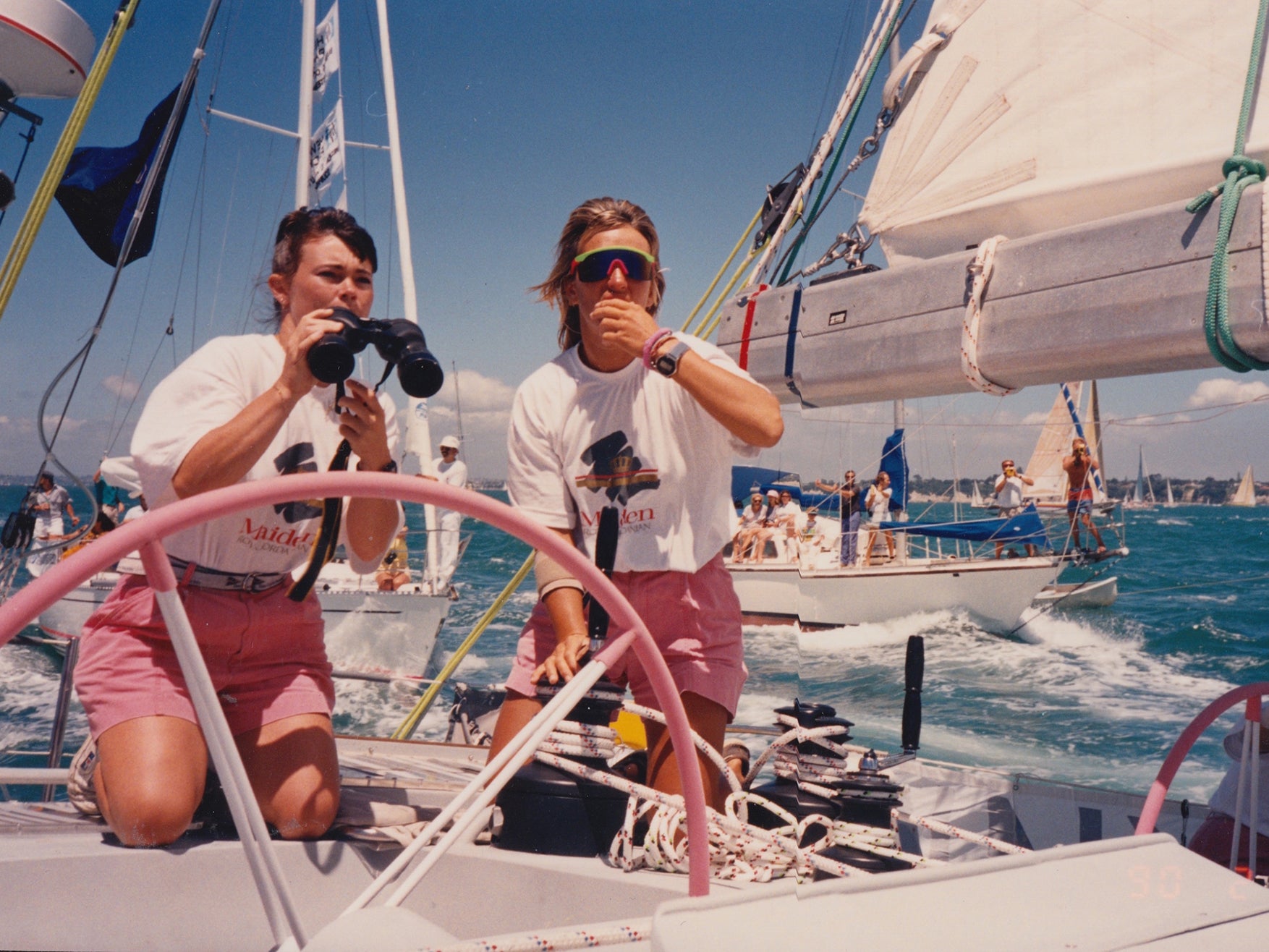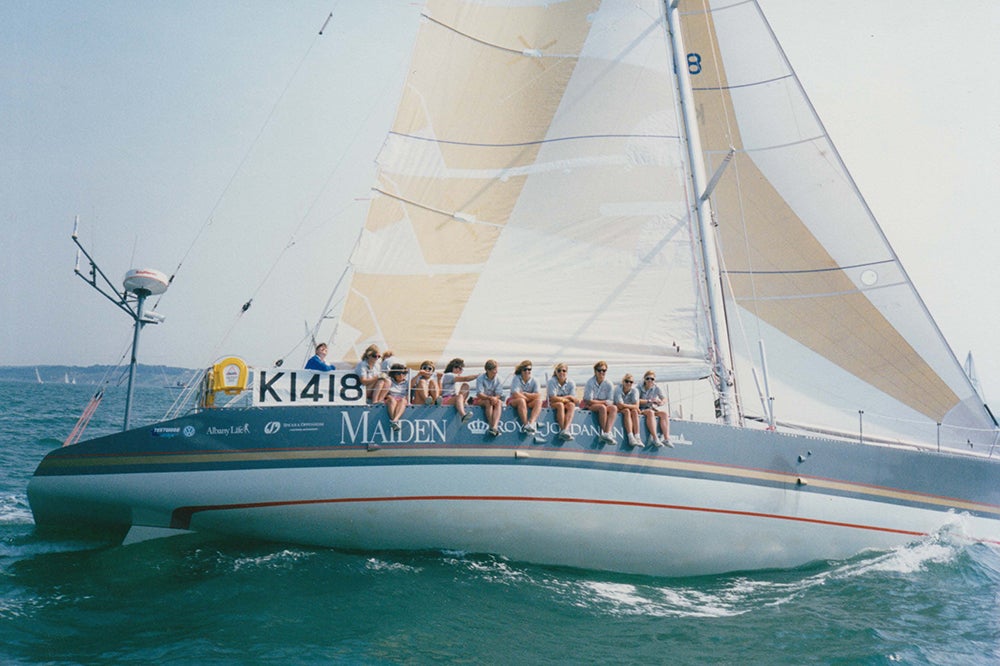Setting sail for feminism: A new generation of female sailors
Tracy Edwards smashed the glass ceiling when she skippered the first all-female crew to sail around the world. Now, her daughter will taking to the seas on the very same vessel

Your support helps us to tell the story
From reproductive rights to climate change to Big Tech, The Independent is on the ground when the story is developing. Whether it's investigating the financials of Elon Musk's pro-Trump PAC or producing our latest documentary, 'The A Word', which shines a light on the American women fighting for reproductive rights, we know how important it is to parse out the facts from the messaging.
At such a critical moment in US history, we need reporters on the ground. Your donation allows us to keep sending journalists to speak to both sides of the story.
The Independent is trusted by Americans across the entire political spectrum. And unlike many other quality news outlets, we choose not to lock Americans out of our reporting and analysis with paywalls. We believe quality journalism should be available to everyone, paid for by those who can afford it.
Your support makes all the difference.Mack Edwards-Mair is an only child, but she likes to say that she is second born. Her mother’s first child, Edwards-Mair says, is a 58-foot yacht named Maiden, which is set to make another trip around the world.
The first time Maiden traversed the globe was 30 years ago when Edwards-Mair’s mother, Tracy Edwards, skippered the first all-female crew in the 1989-90 Whitbread Round the World Race.
Edwards’ story – her imperfect childhood, rebellious teenage years and crew’s perilous nine-month journey at sea – is detailed in a new documentary, Maiden, by British filmmaker Alex Holmes.
For Edwards-Mair, the story of Maiden is a part of everyday life. She has heard about her mother’s ocean journey since she was young; her study has been converted into a home office for her mother to run a restorative project for the ship called The Maiden Factor, and next month, the 19-year-old will set sail on Maiden as it makes its latest round-the-world excursion as part of a promotional trip to raise funds for educational efforts that would benefit girls.
It wasn’t until the film’s release, however, that Edwards-Mair says she truly realised her mother’s contribution to the sport.
“My whole life (Maiden’s story) was just words, but then seeing it was crazy,” Edwards-Mair says. “I had no idea that was what it was like. It’s so amazing. And it’s crazy to see [my mother] on the big screen and have people coming up to her afterwards and wanting to shake her hand or just say thank you.”
At 16, Edwards left her home and backpacked to Greece, where she took up work as a stewardess on charter yachts. Over the next decade, she learned to sail and joined her first Whitbread race – an around-the-globe yacht race, which is considered one of the most prestigious in the world and is now called the Ocean Race – cooking meals for an all-male crew. Unable to participate as a fully integrated member of the crew, Edwards sought to organise a female team to compete in the race.
“I think one of the reasons I became interested in the Whitbread was that it gave me the chance to become part of an extraordinary experience I had heard so much about,” Edwards says. “I did not particularly want to be a cook, but that was the only way girls could get on the boat at the time. That’s when I realised I needed to do something to change the way things were.”
“The world I lived in didn’t allow women to sail in the Whitbread. I just thought, I want to do this, so I need to change my world and my place in it.”
Recruiting skilled sailors proved no issue for Edwards, but it took the team another three years to find a sponsor who would support a group of women. Thanks to Edwards’ mentor, King Hussein I of Jordan, with whom she had become acquainted through her travels, the crew was able to secure a ship in poor condition and the funds to participate in the race. Thus, Maiden was born.
“The world I lived in didn’t allow women to [sail in the Whitbread],” Edwards says. “I just thought, I want to do this, so I need to change my world and my place in it.”
The 33,000-mile competition charted a course spanning the UK, Chile and Australia. The race – in which a mistake can literally be fatal – is documented in Holmes’ film using footage shot by crew members. Years later, Edwards’ narrative provides a timely reflection on the state of sexism in sports and society.
“I remember thinking, ‘Oh my goodness. My daughter, all these years later, is still going to face so many of the barriers that Tracy faced 25 years ago,’ ” Holmes, the director, says of his experience hearing Edwards’ story in 2014. “It really shocked me that so little had changed underneath. That made me think not only was this a beautiful story to tell, but also a really important story to tell.”
Holmes says he recognises how conversations around gender parity in the workplace have changed, with movements such as #MeToo and TimesUp, since he started work on the documentary five years ago. The film’s release comes at a time when issues around pay equity in sports have become a larger part of the public conversation, following the US women’s nationals team’s success in the Women’s World Cup and calls for its players to be paid the same as the men’s team.

“The [misogynistic] attitudes are so ingrained in people, it becomes hard to change them after a lifetime,” Edwards says. “We’ve got to get the new blood coming up into the governing bodies and agencies, and I think we’ve got to catch up in other sports as well. I think we’re lagging behind.”
Edwards pointed out that despite larger issues of gender inequality within sailing, there are a number of “extraordinary” women who have risen to the top of the sport. Among them is Leslie Egnot, an Olympic medalist, former coach and current member of Yachting New Zealand’s Olympic Committee. Like Edwards, Egnot achieved another historic milestone for women in sailing when she skippered the first female crew in the America’s Cup race in 1995. She says she followed Maiden’s journey closely five years earlier.
“I thought what an amazing thing to be doing,” Egnot says. “I thought it would be pretty cool to do, but I was doing Olympic sailing at that time, so I wasn’t involved with what they were up to. But they definitely pioneered the way with their achievements.”
While Edwards says she would like to see more girls, especially teenagers, involved in sailing, her latest battle is not in the realm of sports. Edwards and her daughter have teamed up to fight for gender equality in education. Following the Whitbread race, Edwards was forced to sell Maiden, and in 2014, the yacht was discovered rotting in the Seychelles. Four years later, Edwards and her crew were able to buy Maiden back and complete its restoration. Now, the iconic yacht has a new mission.
“When my mom rescued Maiden, I says to her: ‘You just bought a 58-foot yacht. What are we going to do with it?’” Edwards-Mair says. “We thought about donating it to a youth sailing organisation, but she’s always helping these charities for girls’ education, so I said to her, ‘Why don’t you use it to do that?’”
Maiden is currently at sea on its latest world tour, during which it is making 28 stops. The tour is led by a new generation of female sailors from around the world, and is designed to help raise funds for The Maiden Factor’s affiliate charities.
Edwards-Mair has a creative role and takes photos for the organisations’ website and blog, and in a month, she will participate in a 17-hour leg of Maiden’s journey, as the ship sails from Vancouver to Seattle.
While she admits she is actually “terrified” of the ocean and does not have a seafaring proclivity like her mother, Edwards-Mair says she is looking forward to participating in the journey. For her, it will be an opportunity to glimpse into the world of a woman she says has inspired her her whole life.
“She’s made me believe that whatever I wanted to do, I could do it,” she says.
© Washington Post
Join our commenting forum
Join thought-provoking conversations, follow other Independent readers and see their replies
Comments